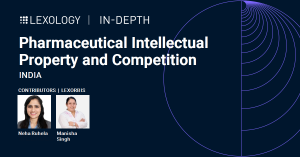 Introduction
Introduction
This chapter provides an overview of India’s legislative and regulatory framework for drug and biologic approvals, drug pricing mechanisms, and patent regulations as well as the processes addressing intellectual property disputes associated with generic and biosimilar products. We also outline the interplay between intellectual property and antitrust law in India and discuss how strategies involving pharmaceutical intellectual property may come under scrutiny from a competition angle. Overall, the Indian policy and systems are designed to strike a balance between the competing interests of fostering pharmaceutical innovations, ensuring public health, and promoting generic industries.
Year in review
This review offers an update on the landscape of pharmaceutical intellectual property and antitrust issues while focusing on India’s significant policy, regulatory, and judicial developments in the sector during the past year. A pivotal moment occurred in July 2023 when the Delhi High Court delivered a landmark judgment on the conflicting zone between patent and competition laws. In reconciling the two statutes, it held that the Competition Act deals with the anticompetitive agreements and abuse of dominant position generally and there is clear legislative intent that the Patents Act being special law would override the Competition Act as regards anticompetitive behaviour by a patentee. In particular, any anticompetitive practice of a pharmaceutical patent holder would be addressed exclusively by the statutory patent authority and IP courts. The ruling marks a tectonic shift in Indian jurisprudence prompting pharmaceutical innovators to recalibrate their IP strategy.
The recently constituted specialised IP courts continued to provide efficacious and expeditious resolution of patent litigations and appeals. The current review of decisions reflects the balanced approach adopted by Indian courts in the adjudication of pharmaceutical patent cases. On one hand, enforcement of patent rights remained intact, with owners of valid patents receiving interim injunctive and other forms of relief in the event of infringements. On the other hand, courts continued to be watchful to check any attempt at anticompetitive practices using evergreening, line extensions, or serial patenting strategies. In appropriate cases, courts have allowed the patent applicant to submit post-filing evidence to establish the patentability requirements. Biologics innovators obtained favourable orders against biosimilar manufacturers in cases of alleged non-compliance with drug regulations and guidelines. The defence of public health factors (affordability and accessibility to drugs) may be considered in infringement proceedings, nonetheless, it is not a complete exception to a legally valid patent, and interim relief may be granted.
Patents Amendment Rules, 2024 have been notified introducing several provisions aimed at simplifying the process of obtaining and managing patents. The procedure of pre-grant oppositions has been streamlined to curb fraudulent oppositions and simultaneously encourage genuine oppositions. The frequency of filing the statements of working of patents has been reduced. On the policy front, the new National Pharmaceuticals Policy, 2023 has been drafted to simplify drug and licensing regulations.
To read more visit the Chapter first published by: Lexology here
Please find attached the link to pdf of the Chapter: Lexology In-Depth – Pharmaceutical Intellectual Property and Competition – India (002)
Authors: Manisha Singh and Neha Ruhela



